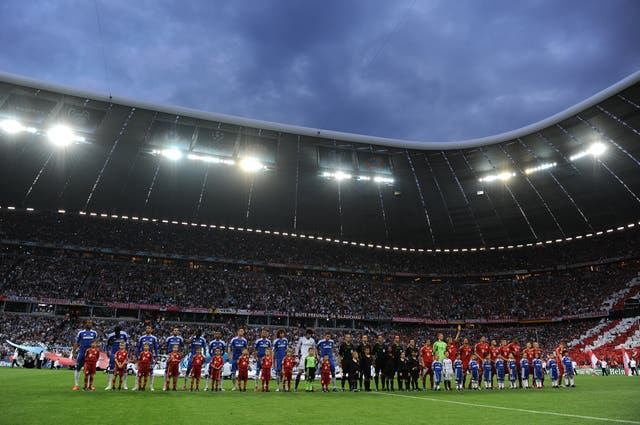The Football Association is hoping Wembley can be at its full 90,000 capacity for the Euro 2020 final, but accepts 45,000 might be a more realistic target.
The national stadium was awarded an extra match on Friday when UEFA handed it Dublin's last-16 tie, after stripping the Irish capital of all four matches it was due to host. The authorities in Ireland could not provide UEFA with minimum capacity guarantees amid the coronavirus pandemic.
The decision means if England win their group they will play their first four matches of the tournament at home, before travelling to Rome for the quarter-finals.
Important updates on #EURO2020 venue changes, capacities and fan information 👇https://t.co/uaBbz1F3ue
— UEFA EURO 2020 (@EURO2020) April 23, 2021
It is understood Newcastle's St James' Park was in contention to host games with the Government's backing, but UEFA opted to give Dublin's group matches to the Russian city of St Petersburg where the minimum guarantee is already set at 50 per cent capacity.
The FA has guaranteed a minimum of 25 per cent capacity for England's group games at Wembley but is confident of going significantly higher for the knockout stages.
"We have got until June 2 to tell UEFA what our numbers can be for the round of 16, semi-finals and final," FA chief executive Mark Bullingham said.

"Our hope is that we will be 50 per cent full for those games, but clearly that's not our decision, that's for the authorities to make.
"From our perspective we think 50 per cent might be more realistic at the moment, but if the situation improves I would love the final to be full. We want as many fans as possible to be able to experience the Euros."
The Mayor of London Sadiq Khan welcomed an additional match coming to Wembley and said: "London is the sporting capital of the world, so of course when Dublin sadly had to withdraw as a venue for the Euros we stepped up.
"It's fantastic that an additional knockout game will be played at Wembley this summer. Now let's hope we top our group so it can be a home game for England."
Wembley is due to welcome 21,000 fans for the FA Cup final on May 15 as part of the Government's Events Research Programme (ERP) to examine how to get spectators back into venues in financially viable numbers from June 21.
UEFA's announcement confirmed what many had long expected – that Dublin would miss out on hosting.
FAI Chief Executive Jonathan Hill reacts to UEFA EURO 2020 decision
âž¡ï¸ https://t.co/20RAUxesa5 #EURO2020 pic.twitter.com/GJ27vi6TWJ
— FAIreland âš½ï¸ðŸ‡®ðŸ‡ª (@FAIreland) April 23, 2021
Football Association of Ireland chief executive Jonathan Hill said: "The Dublin LOS (local organising structure) partners have worked tirelessly together since the pandemic first struck last year to facilitate the staging of these games.
"The reality here is that circumstances beyond our control have led to the games being moved and we have to acknowledge that public health must come first in a global pandemic.
"This is the end of the EURO 2020 project but the dedication and professionalism of all involved makes everyone at the FAI more determined than ever to bring big games and big tournaments to our country and I am delighted that UEFA have recognised our endeavours by agreeing to work with us on big projects for Dublin and Ireland in the future, including the staging of a UEFA club (competition) final at the Aviva Stadium after 2023 which is something to really look forward to as we enter our centenary year."

Bilbao was the other original host to lose its games. The Basque city's four matches have been moved to Seville instead, where a 30 per cent capacity has been agreed with the local authorities.
Munich has held onto its four matches after being in doubt up until Friday, and has promised a minimum crowd of 14,500 at the Allianz Arena.
Rome will host the tournament's opening match on June 11.
/https%3A%2F%2Fsportsmole-media-prod.s3.gra.io.cloud.ovh.net%2F22%2F30%2Flucbro.jpg)
/https%3A%2F%2Fsportsmole-media-prod.s3.gra.io.cloud.ovh.net%2F21%2F50%2Fitaly-euro-2020.jpg)
/https%3A%2F%2Fsportsmole-media-prod.s3.gra.io.cloud.ovh.net%2Fuploads%2F2025%2F09%2Fimago1067002084-68d81cb7755dd355621187.jpg)
/https%3A%2F%2Fsportsmole-media-prod.s3.gra.io.cloud.ovh.net%2Fuploads%2F2025%2F11%2Fdavid-artell-69161676909bb651220613.jpg)
/https%3A%2F%2Fsportsmole-media-prod.s3.gra.io.cloud.ovh.net%2F25%2F11%2Fmorcal.jpg)
/https%3A%2F%2Fsportsmole-media-prod.s3.gra.io.cloud.ovh.net%2Fuploads%2F2025%2F10%2Fgibbs-white-68fa8c3e4aef8582500673.jpg)